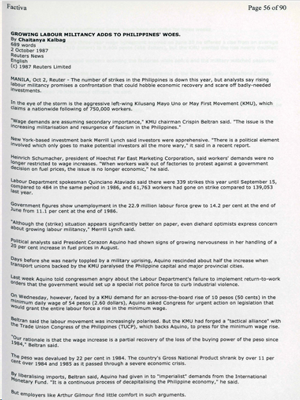GROWING LABOUR MILITANCY ADDS TO PHILIPPINES’ WOES
[Reuters]
Published date: 2nd Oct 1987
2 October 1987
Reuters News
English
(c) 1987 Reuters Limited
MANILA, Oct 2, Reuter – The number of strikes in the Philippines is down this year, but analysts say rising abour militancy promises a confrontation that could hobble economic recovery and scare off badly-needed Investments.
In the eye of the storm is the aggressive left-wing Kilusang Mayo Uno or May First Movement (KMU), which Claims a nationwide following of 750,000 workers.
“Wage demands are assuming secondary importance,” KMU chairman Crispin Beltran said. “The issue is the increasing militarisation and resurgence of fascism in the Philippines.”
New York-based investment bank Merrill Lynch said investors were apprehensive. “There is a political element Involved which only goes to make potential investors all the more wary,” it said in a recent report.
Heinrich Schumacher, president of Hoechst Far East Marketing Corporation, said workers’ demands were no longer restricted to wage increases. “When workers walk out of factories to protest against a government decision on fuel prices, the issue is no longer economic,” he said.
Labour Department spokesman Quinciano Ataviado said there were 339 strikes this year until September 15, Compared to 484 In the same period In 1986, and 61,763 workers had gone on strike compared to 139,053 last year.
Government figures show unemployment in the 22.9 million labour force grew to 14.2 per cent at the end of June from 11.1 per cent at the end of 1986.
“Although the (strike) situation appears significantly better on paper, even diehard optimists express concern about growing labour militancy,” Merrill Lynch said.
Political analysts said President Corazon Aquino had shown signs of growing nervousness in her handling of a 20 per cent increase in fuel prices in August.
Days before she was nearly toppled by a military uprising, Aquino rescinded about half the increase when transport unions backed by the KMU paralysed the Philippine capital and major provincial cities.
Last week Aquino told congressmen angry about the Labour Department’s failure to Implement return-to-work orders that the government would set up a special riot police force to curb industrial violence.
On Wednesday, however, faced by a KMU demand for an across-the-board rise of 10 pesos (50 cents) In the minimum daily wage of 54 pesos (2.60 dollars), Aquino asked Congress for urgent action on legislation that would grant the entire labour force a rise in the minimum wage.
Beltran said the labour movement was increasingly polarised. But the KMU had forged a “tactical alliance” with the Trade Union Congress of the Philippines (TUCP), which backs Aquino, to press for the minimum wage rise.
“Our rationale is that the wage increase is a partial recovery of the loss of the buying power of the peso since 1984,” Beltran said.
The peso was devalued by 22 per cent in 1984. The country’s Gross National Product shrank by over 11 per cent over 1984 and 1985 as it passed through a severe economic crisis.
By liberalising imports, Beltran said, Aquino had given in to “imperialist” demands from the International Monetary Fund. “It is a continuous process of decapitalising the Philippine economy,” he said.
But employers like Arthur Gilmour find little comfort in such arguments.
Gilmour is the president of Nestle Philippines, a major food processor. About 1,500 workers at three Nestle factories, members of a KMU-affiliated union, have been on strike for three weeks.
Gilmour said when Nestle’s three-year wage agreement expired on June 30 he offered a rise from an average monthly 6,400 pesos (310 dollars) to 9,400 pesos (456 dollars), but the KMU wanted the rise nearly doubled.
He said picketers had stopped workers entering the factories while police and the military watched passively.
“We have had five strikes in the past 14 months. All were referred to the National Labour Relations Council, but there has been no action,” Gilmour said,
Nestle had sacked 70 KMU union officers, he said.
He said the conglomerate, which controls about half the Philippines’ milk-product and coffee markets, might be forced to shut down if the strike continued indefinitely.






